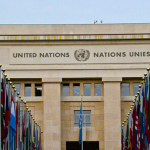
This article appeared in The Hill on April 25th 2022. Click here to view the original article.
The Biden administration is committing an unforced error at the United Nations (UN) that risks reviving the long-simmering issue of the veto power wielded by the Security Council’s five permanent members. Russia’s Feb. 25 veto of a draft resolution deploring its invasion of Ukraine prompted a renewed effort to delegitimize the “Perm Five” veto, a controversial issue since the UN’s founding in 1945.
Astonishment at Moscow’s veto and its result emerged in headlines such as: “Russia’s veto makes a mockery of the United Nations Security Council.” To which, the proper response is: mockery of the Security Council? Where have these people been the last 77 years? Have they forgotten the Council’s near-total Cold War paralysis and irrelevancy, the UN’s longest running failure?
During the Charter’s drafting, many Americans and others objected to granting Security Council vetoes to World War II’s major victors. Eleanor Roosevelt, for example, said, “a good many people think that… the veto power should be done away with in order to insure a wider expression of the majority point of view. For the time being, however, that idea has been set aside.” Not until 1970 did Washington cast its first veto.
The current effort to constrain the veto is led by Liechtenstein (yes, you read that correctly), with more than 50 co-sponsors on a measure requiring the General Assembly, within 10 days of a veto, “to hold a debate on the situation as to which the veto was cast.”
Surprisingly, the Biden administration, alone among the Perm Five, has joined this misbegotten effort, on which the Assembly will vote April 26. With due respect to the good people of Liechtenstein, their government needs better international priorities.
Unwise and unnecessary, the proposed resolution, following Mrs. Roosevelt’s logic, reflects the long-standing urge to weaken and ultimately eliminate the veto. Its proponents apparently either don’t understand or don’t care that, for the United States, an undiminished, unimpaired veto power is an absolute prerequisite to continued participation in the UN itself.
Consider carefully the Biden administration’s own dangerous arguments. Ambassador Linda Thomas-Greenfield criticized Russia for its “shameful pattern of abusing its veto privilege.”
But there never would have been a “Security Council” without the veto, which Joseph Stalin demanded and Franklin Roosevelt accepted. They would be amazed and amused (Mrs. Roosevelt notwithstanding) to hear it called a “privilege.” The Charter’s Article 27 expressly authorizes the veto, to which every original signatory and every subsequent member agreed. In the UN context, the veto is not a privilege, it is a right. Arguing that it is merely a privilege implies it can be taken away or should be relinquished. If that’s President Biden’s view, he should initiate a broad debate on the issue in Congress, which would be especially informative during this midterm election year.
Clearly, there is no acceptable excuse for Russia’s conduct in Ukraine, but “shameful” is in the beholder’s eye. As Elliott Abrams has stressed, the overwhelming majority of America’s recent vetoes have been to protect Israel.
U.S. vetoes were often alone, with France and the United Kingdom deeming America’s position inappropriate or even a little shameful. Certainly, Russia and China weren’t happy. Nonetheless. two of my happiest days as UN ambassador were when I cast Security Council vetoes against unjust anti-Israel resolutions. Limitations on the veto power will never be imposed only on countries casting “shameful” vetoes, but on all permanent members. That is flatly unacceptable to the United States.
Moreover, Liechtenstein’s resolution is utterly unnecessary to achieve the supposed “transparency” its proponents seek. Its immediate real-world impact will be trivial, hardly worth the effort being expended to obtain its passage, unless its cosponsors’ ulterior motives are part of a larger delegitimization effort. No one can say for certain how much this resolution will undermine the veto long-term, but for the U.S. to co-sponsor it suggests either blindness or Biden administration complicity with the delegitimization objective.
It’s not as though vetoes are cast in secrecy. Every veto in UN history, like all formal Council actions, has been made in open, formal Council sessions, open to print and electronic press and the public. Almost all Council members make statements explaining their votes, particularly vetoes, for anyone interested. The Charter (in Article 31) specifically provides that any UN member “may participate… in the discussion of any question brought before the Security Council whenever the latter considers that the interests of that Member are specially affected.”
I cannot recall any instance where the Council has denied a member’s request to speak. The Charter also provides (in Article 24) that the Council “shall submit annual and, when necessary, special reports to the General Assembly for its consideration.” What more is needed?
If anything, the Security Council is now so transparent that its frequently feckless actions are already in plain view. The Biden administration may stand behind Liechtenstein’s proposal, but other nations should understand that this is merely a fit of absence of mind, not a permanent change in American support for the veto power.
John Bolton was national security adviser to President Trump from 2018 to 2019, U.S. ambassador to the United Nations from 2005 to 2006 and held senior State Department posts in 2001-2005 and 1985-1989. His most recent book is “The Room Where It Happened” (2020). He is the founder of John Bolton Super PAC, a political action committee supporting candidates who believe in a strong U.S. foreign policy.